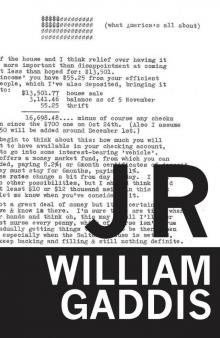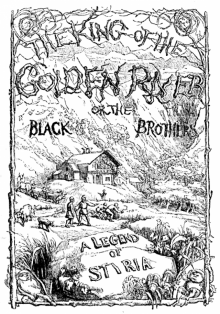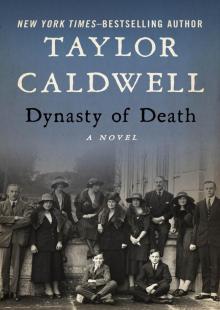J R


Author: William Gaddis
Category: Literature
Published: a long time ago
Series:
View: 831
Read OnlineJ R is the long-awaited novel from William Gaddis, author of The Recognitions, that tremendous book which, in the twenty years since its publication, has come to be acknowledged as an American masterpiece. And J R is a book of comparable magnitude, substance, and humor - a rushing, raucous look at money and its influence, at love and its absence, at success and its failures, in the magnificently orchestrated circus of all its larger - and smaller-than-life characters; a frantic, forlorn comedy about who uses - and misuses - whom.
At the center: J R, ambitious sixth-grader in torn sneakers, bred on the challenge of "free enterprise" and fired by heady mail-order promises of "success." His teachers would rather be elsewhere, his principal doubles as a bank president, his Long Island classroom mirrors the world he sees around him - a world of public relations and private betrayals where everything (and everyone) wears a price tag, a world of "deals" where honesty is no substitute for experience, and the letter of the law flouts its spirit at every turn. Operating from the remote anonymity of phone booths and the local post office, with beachheads in a seedy New York cafeteria and a catastrophic, carton-crammed tenement on East 96th Street, J R parlays a deal for thousands of surplus Navy picnic forks through penny stock flyers and a distant textile-mill bankruptcy into a nationwide, hydra-headed "family of companies."
The J R Corp and its Boss engulf brokers, lawyers, Congressmen, disaffected school teachers and disenfranchised Indians, drunks, divorcées, second-hand generals, and a fledgling composer hopelessly entangled in a nightmare marriage of business and the arts. Their bullish ventures - shaky mineral claims and gas leases, cost-plus defense contracts, a string of nursing homes cum funeral parlors, a formula for frozen music - burgeon into a paper empire ranging from timber to textiles, from matchbooks to (legalized) marijuana, from prostheses to publishing, inadvertently crushing hopes, careers, an entire town, on a collision course with the bigger world . . . the pragmatic Real World where the business of America is business, where the stock market exists as a convenience, and the tax laws make some people more equal than others . . . the world that makes the rules because it plays to win, and plays for keeps.
Absurdly logical, mercilessly real, gathering its own tumultuous momentum for the ultimate brush with commodity trading when the drop in pork belly futures masks the crumbling of our own, J R captures the reader in the cacophony of voices that revolves around this young captive of his own myths - voices that dominate the book, talking to each other, at each other, into phones, on intercoms, from TV screens and radios - a vast mosaic of sound that sweeps the reader into the relentless "real time" of spoken words in a way unprecedented in modern fiction. The disturbing clarity with which this finished writer captures the ways in which we deal, dissemble, stumble through our words - through our lives - while the real plans are being made elsewhere makes J R the extraordinary novel that it is.
From the first-edition dustjacket
At the center: J R, ambitious sixth-grader in torn sneakers, bred on the challenge of "free enterprise" and fired by heady mail-order promises of "success." His teachers would rather be elsewhere, his principal doubles as a bank president, his Long Island classroom mirrors the world he sees around him - a world of public relations and private betrayals where everything (and everyone) wears a price tag, a world of "deals" where honesty is no substitute for experience, and the letter of the law flouts its spirit at every turn. Operating from the remote anonymity of phone booths and the local post office, with beachheads in a seedy New York cafeteria and a catastrophic, carton-crammed tenement on East 96th Street, J R parlays a deal for thousands of surplus Navy picnic forks through penny stock flyers and a distant textile-mill bankruptcy into a nationwide, hydra-headed "family of companies."
The J R Corp and its Boss engulf brokers, lawyers, Congressmen, disaffected school teachers and disenfranchised Indians, drunks, divorcées, second-hand generals, and a fledgling composer hopelessly entangled in a nightmare marriage of business and the arts. Their bullish ventures - shaky mineral claims and gas leases, cost-plus defense contracts, a string of nursing homes cum funeral parlors, a formula for frozen music - burgeon into a paper empire ranging from timber to textiles, from matchbooks to (legalized) marijuana, from prostheses to publishing, inadvertently crushing hopes, careers, an entire town, on a collision course with the bigger world . . . the pragmatic Real World where the business of America is business, where the stock market exists as a convenience, and the tax laws make some people more equal than others . . . the world that makes the rules because it plays to win, and plays for keeps.
Absurdly logical, mercilessly real, gathering its own tumultuous momentum for the ultimate brush with commodity trading when the drop in pork belly futures masks the crumbling of our own, J R captures the reader in the cacophony of voices that revolves around this young captive of his own myths - voices that dominate the book, talking to each other, at each other, into phones, on intercoms, from TV screens and radios - a vast mosaic of sound that sweeps the reader into the relentless "real time" of spoken words in a way unprecedented in modern fiction. The disturbing clarity with which this finished writer captures the ways in which we deal, dissemble, stumble through our words - through our lives - while the real plans are being made elsewhere makes J R the extraordinary novel that it is.
From the first-edition dustjacket
 The King of the Golden River
The King of the Golden River Einstein's Dreams
Einstein's Dreams The Christmas Box
The Christmas Box Dynasty of Death
Dynasty of Death Purity of Blood
Purity of Blood Return to Night: A Novel
Return to Night: A Novel The Damned
The Damned Swindle
Swindle